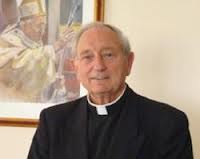Love God and Your Neighbour as Yourself Mt 22:34-40)
Introduction
Love your neighbour as yourself is surely readily understood by all normal human beings. More is written on love for others and self love than on any other human disposition. Descriptions of ordinary family and social life, of the entertainment world, of holidays and travel would be unthinkable if the word ‘love’ were excluded from them. We love persons, we love music and beauty and so on and so on. And “I love you” is the most committing statement in any language.
Love in the Bible
Love in the Bible was never a mere private sentiment. It was a description of activity in favour of others. Its effects could be checked out in practice. God had made rules and his people showed they were worthy to be called his people by living according to these rules. Jesus in his day himself was the perfect exemplar of this. The evangelists do not take us inside his mind very much but they show him continuously interrelating with a great variety of people. They help us to know him through what he did and what he said. In this his love knew no bounds. He was unparalleled in the Palestine of his day. His words at the Last Supper and in the Sermon on the Mount spell out his expectations for his community: Love the way I love. Love one another as I have loved you. The new covenant prophesied by Jeremiah spoke of the law of love “written” in the heart; it was pure gift, pure grace. With Jesus this is reality. But says Jesus to his disciples: when you have done all these things you are still unworthy servants (Lk 17:10)- no self congratulation. Love at its best is giving one’s life for others. No rules control or measure actions performed at this level, that is above and beyond the call of duty. The ordinary world recognizes that. The Victoria Cross or the Medal of Honour cannot be given for an action that could have been commanded by an authority. To cite the American military conditions for receiving such, one must “distinguish himself conspicuously by gallantry and intrepidity at the risk of his life above and beyond the call of duty” (Wikipedia). Such is supposed to be the normal reflex of the disciple of Christ living by grace.
For Jesus people were important not for what they affected, pursued or realized whether religiously, economically, politically or socially. They were important because they were human beings. To try to live life faithfully is to live it lovingly. It is respect and affection for people, all people, whatever their social, economic, religious or racial status. In St. Paul’s words: Love does not seek its own (1 Cor 13:5) and “I have become all things to all men” (1 Cor 9:22).
Such an attitude is not acquired easily. As a work of Grace it costs not less than everything. St. John’s Gospel describes the self-giving of Jesus in death on the cross as glory (Jn 13:13). That is extraordinary. For in Hebrew glory is not just an internal reality either. It is the external manifestation of God’s splendour. It is his awesome presence in effecting mighty deeds in nature and in history. It is there for all to see if they have the eyes to see with. The Apostles did: we saw his glory, his glory as the only begotten of the Father (Jn 1:14), and we saw his glory on the mountain (2 Pt 1:17-18). They had the eyes of faith.
Love God and Neighbour
The question put to Jesus about the greatest commandment might seem to us very trivial and domestic in that tiny world then. But for Jesus it had a universal reference. The Roman Empire was dominant everywhere in the then known world. Centuries of dominance by outside powers should have made any large question about love seemingly redundant in that Palestinian context. Love God and love your neighbour seemed to be the unimaginable conjoined with the unrealizable. One could not imagine God, nor interrelate with him since one could not see him. And was the neighbour everyone from the Roman governor to the person next door? To answer such a question it is necessary to go back to the Sermon on the Mount. At least there one finds reference to selfless love. Clearly such is not just sentiment. It is what each person needs from others just to live. Without love we cannot live. We were born helpless and we die helpless. How do we make our way through this world into which we are inserted without others being responsible for us? Just to think for a single moment about our own life shows us how totally dependent we are on others for our safe coming in birth, and the dignity with which we leave in death. Love is the name we give to the care taken for us and given to us from beginning to end. And what we perceive in our own case we know to be true for everybody else, and the demands it makes on us. Somebody told us that God created us, and our earthly pilgrimage is sustained by sharing with others belief in and love of the God who made us…..but how could we give this any coinage if we were not accepted, embraced and daily inserted into human relationships in the little world where we live out our days- and where we reciprocate such relationships? Some among us show the marvellous reality of this everyday caring for everyone.
Conclusion
Our generation knows more about the past than has ever been known before in the history of the world. Suffering through plagues and wars and deprivation we now know of in detail. Yet the importance of ‘I love you’- and all its entailments, has not been diminished one whit. Life is about loving and being loved. Health and wealth might seem largely to determine its quality. But there is much more. Selfishness destroys it. Those who continually take care of themselves are not lovable. God so loved the world that he gave his only Son to save it (Jn 3:16). Love God and love your neighbour as yourself- that is what Our Lord said. And today’s Gospel reading records it in an unforgettable way. A happy Sunday to you all.
Rev Richard J. Taylor
Spiritual Advisor to MaterCare International
Boarbank Hall, Cumbria, UK










